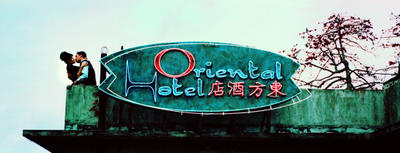2046 (2004)
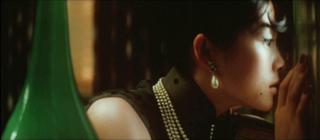 Last night, my wife and I saw, "2046" (2004), Wong Kar Wai's sequel to "In The Mood For Love" (2000)
Last night, my wife and I saw, "2046" (2004), Wong Kar Wai's sequel to "In The Mood For Love" (2000)I feel wholly inadequate in trying to write about this movie. I was knocked out. It is Wong Kar Wai's best film.
Though "Chungking Express" (1994) has a permanent place in my heart, I recognize that Wong Kar Wai's masterpiece - until now - is "In The Mood For Love", a melancholy and beautiful story about a man and woman living next door to each other in a cramped Hong Kong apartment building, whose growing attraction for each other is complicated when they learn that their spouses are having affairs - with each other. A Hong Kong "Brief Encounter" with a twist.
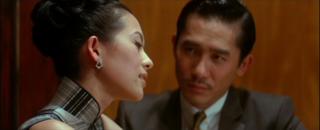 "2046" continues the story of "In The Mood For Love's" protagonist, played by Tony Leung Chiu Wai, and his attempts to continue with his life, broken-hearted and crippled by the memory of The Perfect Romance That Never Was. Tony Leung's character is a writer - writing for newspapers and tabloids, sometimes writing cheap romances or martial arts novels - and is a dead ringer for Marcello Mastroianni's spiritually bankrupt writer character in "La Dolce Vita" (1960). I wonder if the similarity between the two was not entirely accidental. The allusions to other works, Wong Kar Wai's own films primarily, are many and beautifully subtle. In fact, "2046" is one of the better movies about a writer that I've seen in a while, showing nicely how the writer's personal life and his creative work do interact with each other but only indirectly. The artist's inspiration may be born out of the mundane life around him, but often, ironically, it is the most insignificant moments that end up bearing the most fruit - the strange way someone stares, mesmerized, at the smoke from a cigarette. Also nicely shown is how that the writer (or filmmaker?) never really knows what his story is truly about while he is working on it. But if he is honest, he may finally discover that he is only ever writing about himself.
"2046" continues the story of "In The Mood For Love's" protagonist, played by Tony Leung Chiu Wai, and his attempts to continue with his life, broken-hearted and crippled by the memory of The Perfect Romance That Never Was. Tony Leung's character is a writer - writing for newspapers and tabloids, sometimes writing cheap romances or martial arts novels - and is a dead ringer for Marcello Mastroianni's spiritually bankrupt writer character in "La Dolce Vita" (1960). I wonder if the similarity between the two was not entirely accidental. The allusions to other works, Wong Kar Wai's own films primarily, are many and beautifully subtle. In fact, "2046" is one of the better movies about a writer that I've seen in a while, showing nicely how the writer's personal life and his creative work do interact with each other but only indirectly. The artist's inspiration may be born out of the mundane life around him, but often, ironically, it is the most insignificant moments that end up bearing the most fruit - the strange way someone stares, mesmerized, at the smoke from a cigarette. Also nicely shown is how that the writer (or filmmaker?) never really knows what his story is truly about while he is working on it. But if he is honest, he may finally discover that he is only ever writing about himself.The film's performances are excellent and it is a joy to take such interest in a movie's characters. Tony Leung - along with cinematographer Christopher Doyle - has been Wong Kar Wai's collaborator throughout both their careers and, as with other great director/actor collaborations, his performances keep getting richer. The movie is not hurt by the fact that it features several of the best actresses in China.
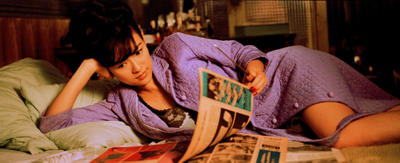 Wong Kar Wai's use of music, usually of popular songs, is predictably effective. The appearance of one of my favorites, Nat King Cole's rendition of "The Christmas Song" was nicely repeated, almost ritually, as an introduction to the movie's several Christmas scenes. I was also shocked and delighted to recognize the opening music cue of the film as from Krzysztov Kieslowski's "The Decalogue" (1989), which like much of the action in "2046", takes place among the residents of a single apartment block.
Wong Kar Wai's use of music, usually of popular songs, is predictably effective. The appearance of one of my favorites, Nat King Cole's rendition of "The Christmas Song" was nicely repeated, almost ritually, as an introduction to the movie's several Christmas scenes. I was also shocked and delighted to recognize the opening music cue of the film as from Krzysztov Kieslowski's "The Decalogue" (1989), which like much of the action in "2046", takes place among the residents of a single apartment block.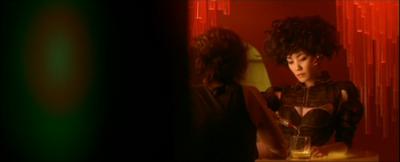 I wish everyone could see the film as I did - in a first-rate theater with a very good print (though there was some dirt on the heads and tails of reels). Christopher Doyle ("the world's only famous cinematographer") may win his first Academy Award for "2046" - not that he hasn't deserved one for his other work. Despite the fact that gazing at the images in "2046", whether of grimy peeling rooms in Singapore or the shimmering silk of 1960's Hong Kong fashion, is a sensual pleasure in itself, I was always eager to watch the characters. Often in movies, I find myself enjoying the cinematography as a welcome break from having to look at unremarkable characters for reel after reel, but in Wong Kar Wai's movies, the photography inevitably seems to create a time and space that frames the characters more clearly, communicates their experiences more eloquently.
I wish everyone could see the film as I did - in a first-rate theater with a very good print (though there was some dirt on the heads and tails of reels). Christopher Doyle ("the world's only famous cinematographer") may win his first Academy Award for "2046" - not that he hasn't deserved one for his other work. Despite the fact that gazing at the images in "2046", whether of grimy peeling rooms in Singapore or the shimmering silk of 1960's Hong Kong fashion, is a sensual pleasure in itself, I was always eager to watch the characters. Often in movies, I find myself enjoying the cinematography as a welcome break from having to look at unremarkable characters for reel after reel, but in Wong Kar Wai's movies, the photography inevitably seems to create a time and space that frames the characters more clearly, communicates their experiences more eloquently.The film is currently available on DVD. Do your best to see it in a theater. But if your local megaplex is stuffed full of "Stealth" (2005) and "The Dukes Of Hazzard" (2005) and you have no choice, I will forgive limited non-theater viewing. In such a case, make it a Wong Kar Wai weekend - "In The Mood For Love" first, then "2046", then repeat.
